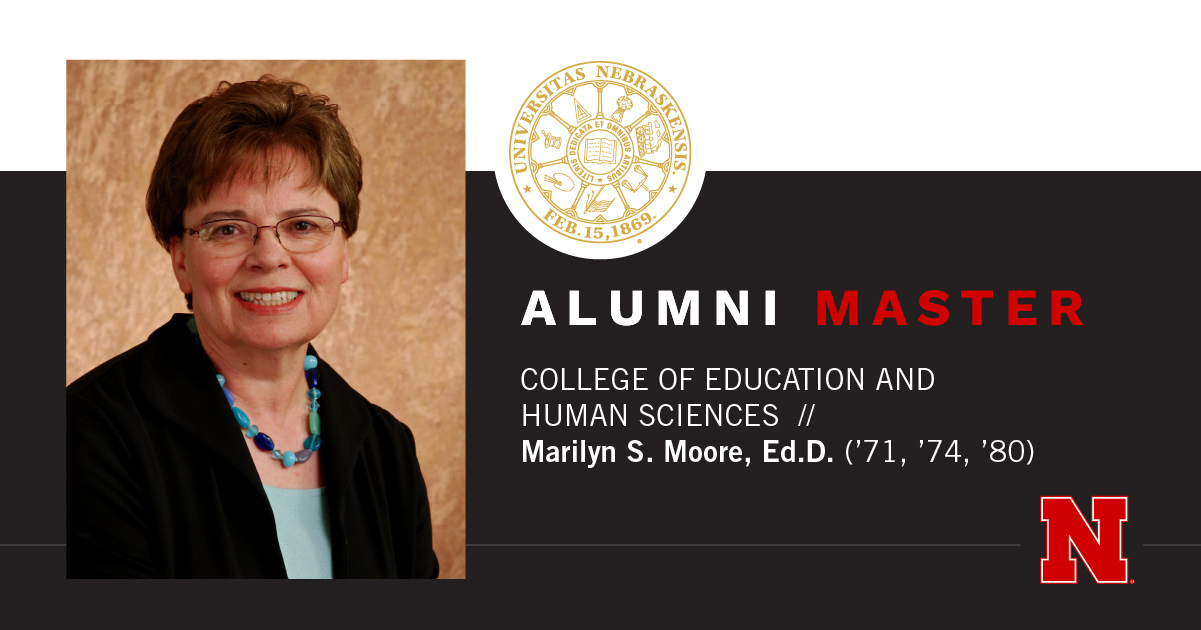
Marilyn Moore is 2024 CEHS Alumni Master
22 Mar 2024 By Grace Fitzgibbon, Nebraska Alumni Association
In a Lincoln Public Schools’ Board of Education presentation report about the progress of a reading program for struggling students, children were invited to come forward and show off their skills — one first grade boy, Michael, brought a huge book of poetry to read to Marilyn (Ruf) Moore. After he recited his practiced poem flawlessly, proudly, he paged through the rest of the book, looked up at Moore, and told her he could read all the rest of them too.
“The magic of that is he knew he was a reader,” Moore said. “Once Michael knows he’s a reader, he’ll read every book that comes his way. That capsulized what I would hope for students. They know they’re good at something, they know they can do it and they’re ready for whatever comes their way.”
Moore’s prolific career is filled to the brim with rewarding moments like this. For more than 40 years, she’s never wavered from her calling to be an educator. She is the retired associate superintendent of Lincoln Public Schools, past president of the Bryan College of Health Sciences, honored with numerous community and education awards, and has served on many community boards such as president of the Lincoln Food Bank, president of the Lied Center Advisory Board and member of the Chancellor’s Alumni Advisory Committee. And another thing: she has a Lincoln middle school with her name on it. Extra poignant because she started her career teaching at a middle school.
“I really like seeing people grow and learn and reach their potential,” Moore said. “I had that opportunity as a middle school teacher with my students. And I had that opportunity as an administrator with the people that I worked with, and the people that I supervised and helped grow. I made that opportunity at (Bryan College of Health Sciences) with both students and faculty members. The promise and potential of human growth is what gives me the greatest hope for our world. Being a part of the growth of any person makes the world a better place.”
The prairie skies of southwest Nebraska still feel like home to Moore, who grew up on a farm south of Cambridge. She ended up at Nebraska for her undergrad, inspired by two of her high school teachers who were alumni, and because of her program’s reputation she stayed to earn her master’s and Ph.D. In the late-1960s/early-1970s, social issues were at the forefront of everyone’s mind. Moore remembers participating in protest marches and becoming aware of her role as a citizen, which later informed her commitment to equity and access as a teacher, administrator and member of the community. On campus was also where she met lifelong friends, gained early governance experience as president of her dorm floor, learned how to be a teacher with excellent professors and practicum experience, and even met her future husband David Moore (’71, ’76, ’81) via a campus ministry group.
“We were both writing dissertations at the same time,” Moore said. “We joke about how our ability to survive a two-dissertation household was one of the greatest accomplishments of our marriage.”
Lincoln is special to Moore, and why she puts so much energy into making it a better place to live. According to her, it’s a very generous community that provides funding for excellent public schools and nonprofit agencies, nurtures excellence in the arts with the Sheldon Museum of Art and world-class performances at the Lied Center, and values parks, trails and outdoor spaces that creates an environment for healthier lives.
“The investments that this community makes in the lives of its citizens are things I value, and I’m really glad to be here,” Moore said. “The presence of a major Division 1 university is impossible to measure but is really significant in the life of a community. It brings the vibrancy of young people as undergraduates, it brings the vast knowledge and the diverse backgrounds of faculty members and graduate students and makes an impact on a community beyond what I can measure but I know it’s important.”
As she’s still on Bryan College dissertation committees and community boards, Moore is not fully retired but she’s close. Sometimes it still feels like she has a full-time job. One day she’ll turn those positions over to new leadership — she’s got books to read and places to go and great nieces and a great nephew to spend time with. When that happens, she has faith in those good people waiting to serve. She devoted her life to teaching them.
“I firmly believe that teaching and learning is the most important work that happens in any community, any day,” Moore said. “If that is done well, everything else in the community will be better. Investing in the lives and learning of students, and in the profession of teachers, is the most important investment that a community can make. There’s never been anything that has drawn me away from that or has convinced me otherwise. It’s the best place for the investment of whatever skills and talents that I have.”
College of Education and Human Sciences